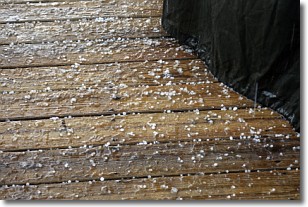Weather Alert in Alaska
Special Weather Statement issued September 5 at 4:25AM AKDT by NWS Anchorage AK
AREAS AFFECTED: Kuskokwim Delta Coast and Nunivak Island
DESCRIPTION: A strong low pressure system in the Bering Sea sends its front eastward to the Kuskokwim Delta Coast by this afternoon. Southeast winds will pick up through the day today and become strong and gusty by tonight. Winds gusts of up to 50 mph at times are likely in communities along the northern Kuskokwim Bay Coast tonight through Saturday morning before slowly diminishing Saturday afternoon. Locations impacted include Kongiganak, Kwigillingok, and Kipnuk. Along with the strong push of southeasterly winds, water levels will also increase with peak water levels occurring late Saturday morning. Water levels are expected to peak at 1 to 2 feet above the normal highest tide line. While significant coastal flooding is not expected, low-lying areas could fill up with water, especially around Kipnuk and Kwigillingok. Higher wave heights are also likely in the coastal waters of the Kuskokwim Delta and near the coast with 4 to 8 foot waves likely. Wave heights will peak Saturday morning and slowly subside through Sunday morning. Higher waves breaking along the coast could cause some localized areas of beach erosion.
INSTRUCTION: N/A
Want more detail? Get the Complete 7 Day and Night Detailed Forecast!
Current U.S. National Radar--Current
The Current National Weather Radar is shown below with a UTC Time (subtract 5 hours from UTC to get Eastern Time).

National Weather Forecast--Current
The Current National Weather Forecast and National Weather Map are shown below.

National Weather Forecast for Tomorrow
Tomorrow National Weather Forecast and Tomorrow National Weather Map are show below.

North America Water Vapor (Moisture)
This map shows recent moisture content over North America. Bright and colored areas show high moisture (ie, clouds); brown indicates very little moisture present; black indicates no moisture.

Weather Topic: What is Rain?
Home - Education - Precipitation - Rain
 Next Topic: Shelf Clouds
Next Topic: Shelf Clouds
Precipitation in the form of water droplets is called rain.
Rain generally has a tendency to fall with less intensity over a greater period
of time, and when rainfall is more severe it is usually less sustained.
Rain is the most common form of precipitation and happens with greater frequency
depending on the season and regional influences. Cities have been shown to have
an observable effect on rainfall, due to an effect called the urban heat island.
Compared to upwind, monthly rainfall between twenty and forty miles downwind of
cities is 30% greater.
Next Topic: Shelf Clouds
Weather Topic: What is Sleet?
Home - Education - Precipitation - Sleet
 Next Topic: Snow
Next Topic: Snow
Sleet is a form of precipitation in which small ice pellets are the primary
components. These ice pellets are smaller and more translucent than hailstones,
and harder than graupel. Sleet is caused by specific atmospheric conditions and
therefore typically doesn't last for extended periods of time.
The condition which leads to sleet formation requires a warmer body of air to be
wedged in between two sub-freezing bodies of air. When snow falls through a warmer
layer of air it melts, and as it falls through the next sub-freezing body of air
it freezes again, forming ice pellets known as sleet. In some cases, water
droplets don't have time to freeze before reaching the surface and the result is
freezing rain.
Next Topic: Snow
Current conditions powered by WeatherAPI.com




